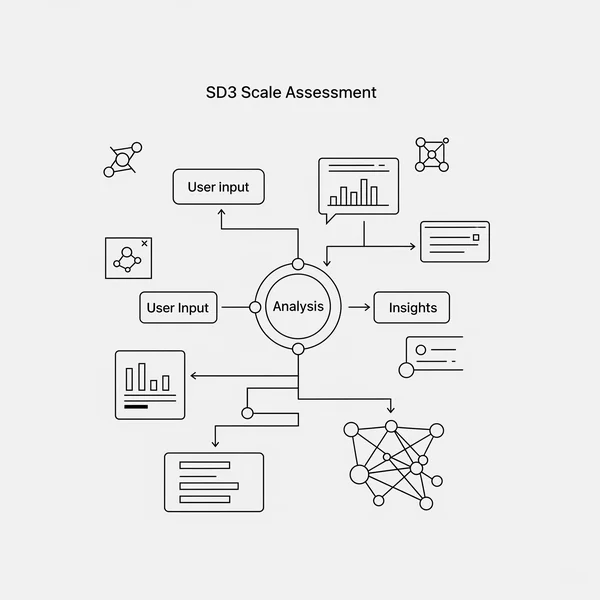What is the Dark Triad Test? A Comprehensive Guide
July 6, 2025 | By Julian Vance
Have you ever been curious about the less discussed aspects of human personality? Perhaps you've come across terms like Machiavellianism, Narcissism, or Psychopathy and wondered, what exactly is the Dark Triad Test and what does it aim to measure? This guide is designed to shed light on the Dark Triad concept, explain its core components, and introduce the Short Dark Triad (SD3) scale – a tool we utilize to help you gain insights into these complex traits. If you're interested in a deeper understanding of this area within personality psychology, you can explore the Dark Triad Test on our website.
Defining the Dark Triad: More Than Just "Bad Guys"
So, what is the dark triad definition in essence? The term "Dark Triad" refers to a psychological construct encompassing three distinct yet interconnected personality traits: Machiavellianism, Narcissism, and Psychopathy. Researchers Delroy Paulhus and Kevin Williams introduced this term in 2002. These traits are often described as "dark" due to their association with behaviors that can be seen as aversive, manipulative, or antisocial. It's important to note that assessments like the Dark Triad Test, particularly when based on the SD3, evaluate these traits on a subclinical level. This means the focus is on tendencies and characteristics present in the general population, rather than diagnosing clinical personality disorders. Gaining insight into these subclinical traits can offer valuable perspectives on everyday human interactions and certain behavioral tendencies.

The Three Core Dark Triad Traits Explained
To fully appreciate what a dark triad test entails and its potential insights, we need to examine its three fundamental components. These dark triad traits each possess unique characteristics, though they often interact in complex ways.
Machiavellianism: The Cunning Strategist
In the context of the Dark Triad, what defines Machiavellianism? Named after the political philosopher Niccolò Machiavelli, this trait is often characterized by a manipulative, exploitative, and sometimes cynical approach to interpersonal relationships. Individuals who score higher in Machiavellianism may be strategic thinkers, often prioritizing their own goals and perhaps believing that the ends justify the means. They might be skilled in areas like flattery or deception to achieve their objectives. This aspect of personality assessment highlights a calculated approach to social navigation. We plan to explore Machiavellianism in greater detail in a future discussion, but you can always begin your self-discovery with our Dark Triad Test.
Narcissism: The Grandiose Self-Admirer
Next, let's consider Narcissism as part of the Dark Triad. This trait typically involves an inflated sense of self-importance, a significant need for admiration from others, and often, a reduced capacity for empathy. Individuals with notable narcissistic traits may exhibit grandiosity, a strong sense of entitlement, and a preoccupation with fantasies of unlimited success, power, or brilliance. While they might appear charming at first, their relationships can sometimes suffer due to self-centeredness. Understanding personality facets like narcissism can illuminate certain relational patterns.
Psychopathy (Subclinical): The Impulsive Risk-Taker
Finally, what does Psychopathy signify within the Dark Triad framework? It is crucial to distinguish subclinical psychopathy, as measured by tools like the SD3, from clinical psychopathy (which has links to conditions like antisocial personality disorder). Subclinical psychopathy is generally characterized by higher impulsivity, a tendency towards thrill-seeking, lower empathy, and a diminished sense of remorse or guilt. Individuals with these tendencies might be more prone to certain antisocial behaviors and may find it challenging to form deep emotional attachments. This trait completes the trio that a personality test for the dark triad seeks to measure.
Understanding the Short Dark Triad (SD3) Scale
Now that we've outlined the traits, how does the SD3 scale actually function? The Short Dark Triad (SD3) is a widely recognized and scientifically validated self-assessment tool developed by Daniel N. Jones and Delroy L. Paulhus in 2014. The dark triad test offered on our site is based on this specific scale. It usually comprises 27 items, with 9 questions designed to measure each of the three primary Dark Triad traits: Machiavellianism, Narcissism, and Psychopathy.
Participants rate their agreement with each statement, typically using a Likert scale (for example, from 1 "Strongly Disagree" to 5 "Strongly Agree"). The SD3 is respected for its conciseness, ease of administration, and solid psychometric properties, making it a favored instrument in personality psychology research and for individuals looking for a quick overview of their personality profile. If you're interested in how this assessment works in practice, you can try the SD3 scale based Dark Triad Test here.

Why Take a Dark Triad Test? Benefits and Insights
You might ask, why should I consider taking a Dark Triad Test? Engaging with an assessment like the SD3 can offer several advantages, primarily focused on fostering self-awareness and a better understanding of one's personality.
-
Enhanced Self-Awareness: It can provide valuable insights into your own behavioral tendencies, interpersonal styles, and potential areas you might not be fully aware of.
-
Understanding Interpersonal Dynamics: Recognizing these traits in yourself or understanding them conceptually can help in navigating complex social situations more effectively.
-
Personal Growth: Awareness is often the initial step towards meaningful change. If certain tendencies are identified as causing difficulties, understanding them can be a foundation for personal development.

It's important to reiterate that a personality test focusing on the dark triad is a tool for self-exploration. It is not intended to be a definitive label or a diagnostic instrument for any clinical conditions.
Your Journey into Understanding the Dark Triad
We've explored the essentials of what the Dark Triad Test is, delved into its core dark triad traits – Machiavellianism, Narcissism, and Psychopathy – and discussed the SD3 scale frequently used to measure them. This exploration into the less commonly discussed facets of personality is not about assigning judgment, but about gaining knowledge and encouraging self-reflection. The dark triad test offers a window into these complex subclinical traits, providing a useful personality assessment for personal insight.
Are you curious about where you might fall on these spectrums? Understanding your unique personality profile can be an enlightening experience. We invite you to take our free SD3 Dark Triad Test to gain your own personal insights.
Dark Triad Test: Frequently Asked Questions
Is the Dark Triad Test a clinical diagnostic tool?
No, a Dark Triad Test, especially one based on the SD3, is designed to measure subclinical personality traits. It functions as a self-assessment tool for personal insight and research purposes. It is not a diagnostic instrument for clinical personality disorders such as Narcissistic Personality Disorder or Antisocial Personality Disorder. For any clinical diagnosis, it is essential to consult a qualified mental health professional.
Who developed the Dark Triad concept?
The psychological construct of the Dark Triad was formally introduced by researchers Delroy L. Paulhus and Kevin M. Williams in their 2002 academic paper. The Short Dark Triad (SD3) scale, which our test utilizes, was subsequently developed by Daniel N. Jones and Delroy L. Paulhus in 2014 to offer a concise and effective measure of these traits.
How long does the Dark Triad Test take to complete?
Our online dark triad test, which is based on the SD3 scale, is designed to be quick and user-friendly. Most individuals can complete it within approximately 5 to 10 minutes. You can experience it for yourself by trying the test now.
What are the specific Dark Triad traits?
The three core dark triad traits that are assessed include:
- Machiavellianism: Often characterized by manipulativeness, strategic thinking, and a somewhat cynical view of others.
- Narcissism: Typically involves grandiosity, a notable sense of entitlement, and a strong need for admiration.
- Psychopathy (Subclinical): Generally marked by impulsivity, a tendency towards thrill-seeking, lower empathy, and diminished remorse. Our personality test for the dark triad provides scores indicating the intensity of these three traits.